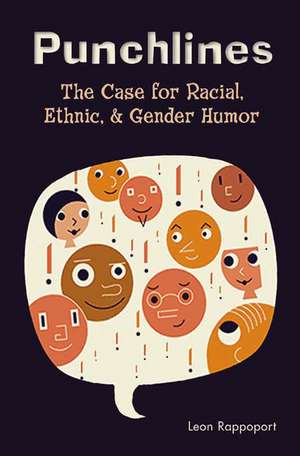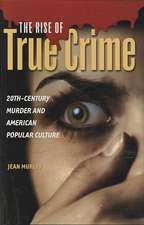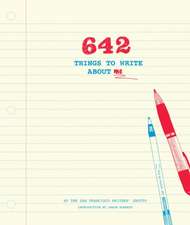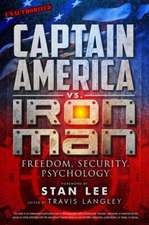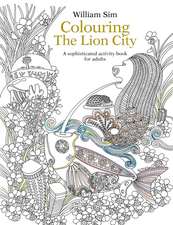Punchlines: The Case for Racial, Ethnic, and Gender Humor
Autor Leon Rappoporten Limba Engleză Hardback – 29 oct 2005 – vârsta până la 17 ani
Preț: 345.67 lei
Preț vechi: 476.25 lei
-27% Nou
Puncte Express: 519
Preț estimativ în valută:
66.15€ • 69.09$ • 54.85£
66.15€ • 69.09$ • 54.85£
Carte tipărită la comandă
Livrare economică 11-25 februarie 25
Preluare comenzi: 021 569.72.76
Specificații
ISBN-13: 9780275987640
ISBN-10: 0275987647
Pagini: 200
Dimensiuni: 156 x 235 x 20 mm
Greutate: 0.45 kg
Editura: Bloomsbury Publishing
Colecția Praeger
Locul publicării:New York, United States
ISBN-10: 0275987647
Pagini: 200
Dimensiuni: 156 x 235 x 20 mm
Greutate: 0.45 kg
Editura: Bloomsbury Publishing
Colecția Praeger
Locul publicării:New York, United States
Notă biografică
Leon Rappoport is Professor Emeritus of Psychology at Kansas State University. A prolific author of many research articles, review essays, and book chapters, he has also published books on personality, decision-making, psychohistory, and the Holocaust. His current work in humor is based on several years spent researching and teaching classes about the significance of ethnic, racial and gender humor at Kansas State University.
Cuprins
ContentsContentsContentsAcknowledgments ixIntroduction: The Hazards and Joys of Racial, Ethnic, and Gender Humor xiWhy should anyone care about such humor, is it really harmful, and how I came to spend years studying it.1.The Sword and Shield Metaphor and Other Perspectives 1Common misperceptions of stereotype humor and a corrective overview.2.What Makes Us Laugh: Humor Theory and Research from Plato and Aristotle to Sigmund Freud 13The perennial questions and answers about why we laugh; modern research showing the social, psychological, and physiological benefits of humor.3.Prejudice, Pride, and Play in Ethnic Comedy 31Theories, research, and the wide range of positive social functions served by humor within minority groups.4.The Origins and Psychology of Stereotypes and Slurs 45Reflections on the unique vocabulary of disparagement, its surprising sources, connections with obscenities, and multiple meanings.5.The Dominant Role of Jews and African Americans: Lenny Bruce, Richard Pryor, and the Culture of Irony 65The rise of irony in American culture and how the major targets of social prejudice became the major creators of contemporary ironic humor.6.Jewish and African American Roots Humor: Saving Grace in the Face of Oppression 81The origins, growth, and characteristic features of traditional Jewish and African American humor.7.Males versus Females, Gays versus Straights, and the Varieties of Gender Humor 101Stereotypes reflecting sexual tensions and social power differences; the rise of women comedians and their struggle against sexist prejudice.8.The "New Breed" of Comedians and Transformation of Ethnicity 119Disparaging humor is not what it used to be; multicultural awareness and the impact of 9/11; why false stereotypes can be funny.9.Becoming a Comedian: Ethnicity Helps but Is Not Enough 129On heredity, patterns of childhood experience, and the benefits of a minority background; learning the craft of comedy is harder than it looks.10.In Defense of Ethnic Humor and Its Role in Our Multicultural Society 149Comedy in the face of prejudice is no sin. The funny-serious benefits of laughter amid the endless dilemmas of diversity.Bibliography 163Index 171
Recenzii
[T]his book will be good source for looking at an important aspect of humor. In defending politically incorrect humor, Rappoport draws on the extensive writing of sociologist Christie Davies, folklorist Alan Dundes, and others but supplies additional observations and conclusions. He presents the sword and shield metaphor clearly: humor is a sword that targets stereotypes and a shield that deflects from them. Humor does not create the stereotypes; it plays with them. The author provides extensive treatment of relevant incongruities among modern humorists, namely Lenny Bruce (for Jewish humor) and Richard Pryor (for African American humor). The discussion continues through more contemporary examples, bringing in an unusual amount of information for such a brief work. Rappoport even reveals Whoopi Goldberg's pre-stage name. Punchlines can be read as an end in itself or as an informative guide to a broader literature. Highly recommended. All readers; all levels.
No-one will be able to fault Professor Rappoport for a lack of breadth of knowledge and he has mastered the literature of folklorists and sociologists about racial, ethnic and gender humor as well as that of his own discipline, psychology..[H]e writes in an admirably clear way. He has delivered his punchlines well and made out an excellent case for racial, ethnic and gender humor.
[T]he volume is packed with information, with both assimilated insights from Rappoport's own research and also from his wide reading in the research literature on humour. many chapters are a pleasure to read and laguage scholars wanting to learn more about humour research and the social psychology aspects of ethnic wisecracking could do well by starting here.
The author's hypothesis is that racial, ethnic, and gender humor (called here stereotype humor) can serve a positive social function. He maintains that stereotype humor acts as a powerful force against prejudice when used to ridicule stereotypes and slurs..[t]his book is recommended for the information it provides on the history of this type of humor.
No-one will be able to fault Professor Rappoport for a lack of breadth of knowledge and he has mastered the literature of folklorists and sociologists about racial, ethnic and gender humor as well as that of his own discipline, psychology..[H]e writes in an admirably clear way. He has delivered his punchlines well and made out an excellent case for racial, ethnic and gender humor.
[T]he volume is packed with information, with both assimilated insights from Rappoport's own research and also from his wide reading in the research literature on humour. many chapters are a pleasure to read and laguage scholars wanting to learn more about humour research and the social psychology aspects of ethnic wisecracking could do well by starting here.
The author's hypothesis is that racial, ethnic, and gender humor (called here stereotype humor) can serve a positive social function. He maintains that stereotype humor acts as a powerful force against prejudice when used to ridicule stereotypes and slurs..[t]his book is recommended for the information it provides on the history of this type of humor.
